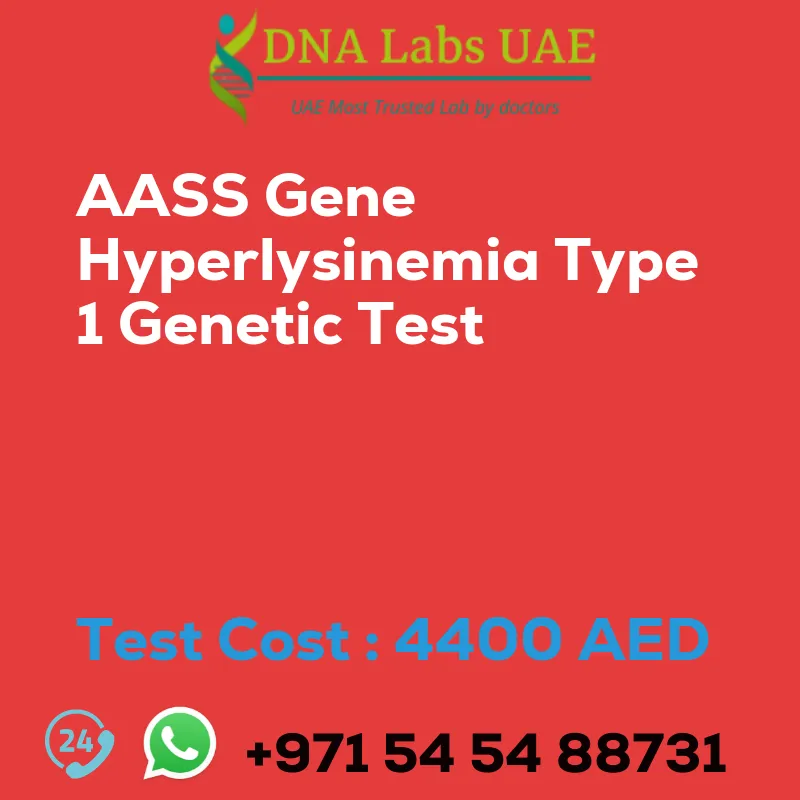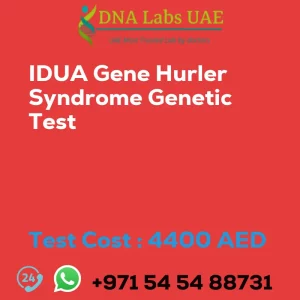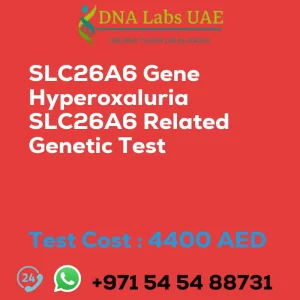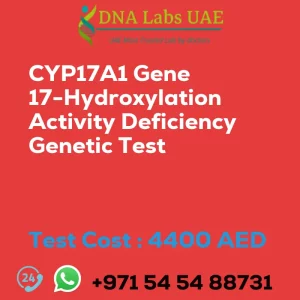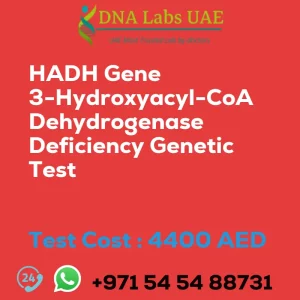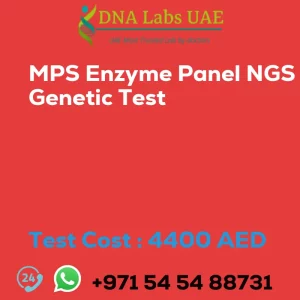AASS Gene Hyperlysinemia type 1 Genetic Test
At DNA Labs UAE, we offer the AASS Gene Hyperlysinemia type 1 Genetic Test. This test is designed to diagnose hyperlysinemia type 1, a rare genetic disorder characterized by elevated levels of lysine in the blood and urine. The test utilizes Next-Generation Sequencing (NGS) technology to analyze the AASS gene for mutations associated with the condition.
Test Details
The AASS gene hyperlysinemia type 1 NGS genetic test is a diagnostic test that utilizes NGS technology to analyze the AASS gene for mutations associated with hyperlysinemia type 1. The test involves extracting DNA from a blood or saliva sample and sequencing the AASS gene to identify any mutations or genetic variants. The results of the test can help confirm a diagnosis of hyperlysinemia type 1 and guide treatment decisions.
Test Components and Price
- Test Name: AASS Gene Hyperlysinemia type 1 Genetic Test
- Components: NGS Technology
- Price: 4400.0 AED
- Sample Condition: Blood
- Report Delivery: 3 to 4 Weeks
- Test Type: Metabolic Disorders
- Doctor: General Physician
- Test Department: Genetics
Pre Test Information
Prior to undergoing the AASS Gene Hyperlysinemia type 1 NGS Genetic DNA Test, it is important to provide the clinical history of the patient. Additionally, a genetic counseling session may be conducted to draw a pedigree chart of family members affected with Hyperlysinemia type 1.
About Hyperlysinemia type 1
Hyperlysinemia type 1 is a rare genetic disorder characterized by elevated levels of the amino acid lysine in the blood and urine. It is caused by mutations in the AASS gene, which provides instructions for producing the enzyme aminoadipic semialdehyde synthase. This enzyme is involved in the breakdown of lysine in the body.
NGS Technology
NGS technology allows for the simultaneous analysis of multiple genes, providing a comprehensive evaluation of genetic variations that may be responsible for hyperlysinemia type 1. This advanced technology enables us to accurately identify any mutations or genetic variants in the AASS gene.
Genetic Counseling
Genetic counseling may be recommended to discuss the implications of the test results and provide information on the inheritance pattern of hyperlysinemia type 1. Our team of experts can guide you through the process and help you understand the results.
Don’t wait any longer. Contact DNA Labs UAE today to schedule your AASS Gene Hyperlysinemia type 1 Genetic Test and get the answers you need.
| Test Name | AASS Gene Hyperlysinemia type 1 Genetic Test |
|---|---|
| Components | |
| Price | 4400.0 AED |
| Sample Condition | Blood |
| Report Delivery | 3 to 4 Weeks |
| Method | NGS Technology |
| Test type | Metabolic Disorders |
| Doctor | General Physician |
| Test Department: | Genetics |
| Pre Test Information | Clinical History of Patient who is going for AASS Gene Hyperlysinemia type 1 NGS Genetic DNA Test A Genetic Counselling session to draw a pedigree chart of family members affected with Hyperlysinemia type 1 |
| Test Details |
AASS gene hyperlysinemia type 1 NGS genetic test is a diagnostic test that uses Next-Generation Sequencing (NGS) technology to analyze the AASS gene for mutations associated with hyperlysinemia type 1. Hyperlysinemia type 1 is a rare genetic disorder characterized by elevated levels of the amino acid lysine in the blood and urine. It is caused by mutations in the AASS gene, which provides instructions for producing the enzyme aminoadipic semialdehyde synthase. This enzyme is involved in the breakdown of lysine in the body. NGS technology allows for the simultaneous analysis of multiple genes, providing a comprehensive evaluation of genetic variations that may be responsible for hyperlysinemia type 1. The test involves extracting DNA from a blood or saliva sample and sequencing the AASS gene to identify any mutations or genetic variants. The results of the test can help confirm a diagnosis of hyperlysinemia type 1 and guide treatment decisions. Genetic counseling may also be recommended to discuss the implications of the test results and provide information on the inheritance pattern of the condition. |

